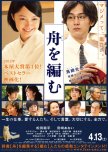Being the major winner of the 86th Japanese Academy Awards with The best Film, best Director, best lead actor, best screenplay, best editing and best sound didn’t come from thin air. The Great Passage had a unique topic and messages to portray.
The film main point is making a dictionary titled “The Great Passage”, like the chief-editor stated: “A dictionary is a ship which crosses the sea of words and languages”. Being a lover of dictionaries and words in general, I am ashamed to admit that I was ignorant of the hardships and the overwhelming mission of making a dictionary that may take more than a decade to accomplish. Therefore, this film was such a penetrating telling of an intriguing theme.
While watching The Great Passage, you will be stroked by two things: the story’s process and the characters’ portrayals and interactions. The first part is a quite slow narration of events that may not sound impressive at first sight. However, with the film progressing; many parts start to connect and the plot becomes as solid as ever. Moreover, light moments were also used to add some entertainment such as the editors eavesdropping on young girls’ conversation to find out new words invented by the younger generations. Although, this film may not be to everyone’s liking because of the theme and the very slow events’ development but I believe that was the perfect way of making such a film.
The second part is what makes the film quite special too; this film’s characterization was carefully handled to not appear surreal or lacking. For instance, the male lead Majime (literally translated as “serious”) was a quiet man who finds trouble with expressing himself; he’s always surrounded by books and has zero friends and thus no social abilities. The only one who’s able to understand him a little is his landlady. When such a man gets the chance to make a dictionary, he was inspired and determined to make it his life goal. In the meantime, he falls in love and starts struggling to win his lady’s heart, despite his lack of self-expression, while continuing his dream of making the dictionary come to life.
On the other hand there are his co-workers at the dictionary department; his fellows in this enormous mission of defining, refining and editing thousands of words in a modern-day dictionary. All of his colleagues were quite endearing but the most captivating character must’ve been Nishioka; an entirely opposite character of Majime; talkative, social and very affectionate; he was Majime’s right hand because dictionaries can’t be made by bookworms alone.
The acting was powerful. Matsuda Ryuhei is a very talented and versatile actor; I’ve got the chance to see him in five different roles so far and I loved him in all of those but this must be where I become a great fan of his acting style: expressive, calm but turns intense in need. His portrayal of Majime’s was perfect; he involves you with his character at every facial expression. Other actors were also quite good in here especially Miyazaki Aoi and Odagiri Joe, one heck of an iconic Japanese actor.
The selected music for this film was very well synchronized with the film’s theme and developments. It adds a great taste to the watching experience. The cinematography was also pretty well conveyed considering the fact that this film contained many time jumps from the 1995 till 2010.
Watch if:
-You’re interested in different types of films.
-You like watching inspirational films.
-You like to learn more about dictionaries.
-You like watching high-profile acting.
Do not watch if:
-You can’t handle slow films.
-You’re looking for romance.
-You’re not interested in dictionaries or words.
-You find inspiring stories “boring”.
The Great Passage is a motivating film that handles a different topic. It’s certainly not for everyone but if you can handle it then it’s undoubtedly one of those hidden gems that leave you with a smile on your face.
Was this review helpful to you?


























